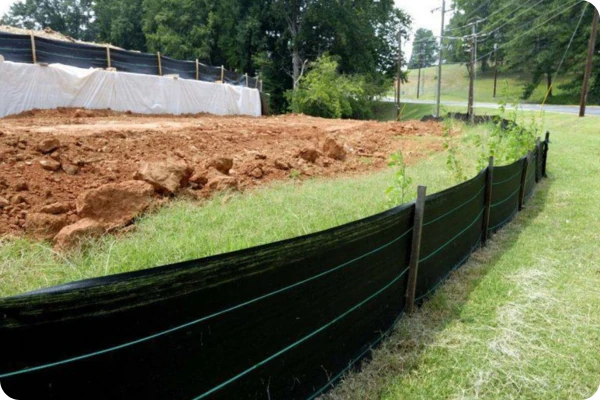Effective stormwater management is critical during construction projects. Without proper controls, rainwater can wash sediment, debris, and pollutants off-site, leading to regulatory violations, costly fines, and environmental harm. Property owners, contractors, and developers must understand how to manage stormwater effectively to maintain compliance and protect local waterways.
This guide outlines best practices for stormwater management during construction to help prevent violations and ensure project success.

Why Stormwater Management Matters on Construction Sites
Construction sites are particularly vulnerable to stormwater runoff due to soil disturbance, exposed materials, and altered drainage patterns. Uncontrolled runoff can:
- Carry sediment, oil, and chemicals into nearby streams and storm drains.
- Cause localized flooding or erosion on-site and downstream.
- Trigger Notices of Violation (NOVs) from state or local regulatory agencies.
- Delay projects and increase costs for remediation and legal fees.
In the Mid-Atlantic region, including Maryland, Virginia, Washington, D.C., and Delaware, stormwater management regulations are enforced by state agencies and often align with the EPA’s National Pollutant Discharge Elimination System (NPDES) Construction General Permit.
Key Regulations You Must Follow
Before breaking ground, it’s essential to understand the regulatory framework for stormwater compliance:
- NPDES Construction Permit: Required for sites disturbing one acre or more.
- Stormwater Pollution Prevention Plan (SWPPP): A written plan detailing erosion and sediment control measures.
- Regular Inspections: Typically weekly or after rain events, with documented reports.
- State-Specific Requirements:
- Maryland: Overseen by the Maryland Department of the Environment (MDE).
- Virginia: Regulated by the Virginia Department of Environmental Quality (DEQ).
- Washington, D.C.: Managed by the Department of Energy & Environment (DOEE).
- Delaware: Enforced by the Delaware Department of Natural Resources and Environmental Control (DNREC).
Failure to comply with these requirements can result in fines, stop-work orders, and mandatory remediation efforts.
Best Practices for Stormwater Management During Construction
Implementing proactive measures can help avoid violations and keep your project on schedule.
1. Develop a Comprehensive SWPPP
Your Stormwater Pollution Prevention Plan should identify:
- Potential pollutant sources (e.g., soil piles, fuel storage areas).
- Erosion and sediment control practices.
- Inspection and maintenance schedules.
- Emergency response protocols.
A well-documented SWPPP not only ensures compliance but also provides clear guidance for all personnel on-site.
2. Use Effective Erosion and Sediment Controls
Erosion and sediment control is the backbone of construction stormwater management. Common methods include:
- Silt Fences: Prevent sediment from leaving the site.
- Sediment Basins: Capture runoff and allow sediment to settle.
- Stabilized Construction Entrances: Reduce tracking of soil onto public roads.
- Mulching and Hydroseeding: Protect exposed soils from erosion.
Ensure these controls are properly installed, regularly inspected, and promptly repaired when damaged.
3. Manage Construction Materials and Waste
Pollutants like concrete washout, fuels, and paints must be stored and disposed of properly:
- Use covered containers for hazardous materials.
- Designate washout areas away from storm drains.
- Regularly remove construction debris and litter.
4. Stabilize Exposed Soil Quickly
Temporary or permanent stabilization reduces erosion risk. Options include:
- Temporary seeding or mulching.
- Rolled erosion control products.
- Permanent vegetation once construction phases are complete.
5. Maintain and Inspect BMPs Regularly
Best Management Practices (BMPs) such as silt fences or inlet protections must be inspected weekly and after significant rainfall. Promptly address deficiencies to maintain effectiveness and stay compliant.
6. Train Your Crew
Ensure all workers understand stormwater requirements, proper installation of controls, and reporting procedures. Well-trained crews are less likely to overlook critical compliance measures.
Avoiding Violations and NOVs
Notices of Violation (NOVs) are often issued due to:
- Missing or poorly maintained BMPs.
- Inadequate documentation of inspections.
- Sediment-laden runoff leaving the site.
- Unpermitted discharges into storm drains or waterways.
Preventing NOVs requires consistent oversight, proactive maintenance, and thorough documentation throughout the project lifecycle.
Partner with Stormwater Compliance Experts
Managing stormwater during construction can be complex, especially with evolving local regulations. Partnering with experienced stormwater management professionals ensures:
- Accurate permitting and plan development.
- Proper installation and maintenance of BMPs.
- Timely inspections and reporting to prevent fines or delays.
Conclusion
Stormwater management during construction is not optional – it’s essential. By developing a robust SWPPP, installing and maintaining effective controls, and staying vigilant with inspections, you can safeguard your project from violations and protect the surrounding environment.
If you’re managing a construction site in Maryland, Virginia, Washington, D.C., or Delaware, iSTORMWATER can help you navigate regulations and keep your project compliant from start to finish.
📞 Call us at (410) 231-3455 or 💬 Contact us online.
Real Results
iStormwater LLC was an excellent choice. They made the process of the Stormwater pond repairs seamless. They took charge of the project and got the project approved and passing the inspection. We highly recommend them and would use them again.
Incredible stormwater management service. The owner John consulted on a property I manage and ended up saving us thousands of dollars in environmental fees from the government. Now, our property is compliant with the EPA and we have a great partner to keep us maintained on stormwater regulations over time.
So helpful with all of my water issues.
Great communication and leadership and a family friendly atmosphere. Thank you John!
Erosion is one of the most persistent challenges in stormwater management. Without proper controls, runoff can carry away valuable soil, clog drainage systems, and pollute...
- Annapolis
- Anne Arundel County
- Baltimore County
- Baltimore
- Bel Air South
- Bethesda
- Bowie
- Cecil County
- Charles County
- Columbia
- Gaithersburg
- Glen Burnie
- Howard County
- Montgomery County
- Pasadena
- Prince George’s County
- Rockville
- Severna Park
- St. Mary’s County



